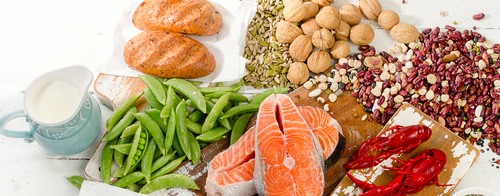
Vitamin B9 - B12

Photo: Shutterstock
There is no single vitamin B, because this is a group of vitamins that is vital for the body and its health. Vitamins of this type can only be taken in through diet.
B9 - Folat
B12 - Cobalamin
VITAMIN B9 (FOLAT)
This water-soluble vitamin, which is very important for cell function, is significant for reproduction and growth. It works closely with vitamins B1, B6 and B12 in metabolism and is found in many plant and animal foods.
Folate is very sensitive, does not tolerate heat, light or air. Over 50 percent of its effect is lost during short storage. In contrast, the synthetically produced form called folic acid is stable in heat, air and light.
Folic acid also has the advantage that the human body can absorb almost 100 percent of this vitamin in the form of tablets or fortified foods - as opposed to almost only 50 percent from food.
An adequate supply of folic acid is particularly important for pregnant and breastfeeding women. This is because an undersupply increases the risk of an open back - also known as spina bifida or neural tube defect.
Important for:
- the formation of new cells
- the formation of the hereditary substance DNA
- blood formation
- the renewal of mucous membranes, e.g. the stomach, intestines and lungs need a lot of folic acid
- protein metabolism
- the breakdown of homocysteine (an intermediate product in protein metabolism), which is partly responsible for heart attacks, malformations and premature births
- the prevention of arteriosclerosis
- the nervous system: helps in the production of the neurotransmitters serotonin, noradrenaline and dopamine
- women of childbearing potential and pregnant women
Deficiency symptoms:
- Fatigue
- anemia
- Diseases of the gastrointestinal tract
- Mucosal damage
- Weakness of the immune system
- Lack of concentration
- Rheumatic complaints
- Growth disorders
- Reproductive disorders such as miscarriage, nerve damage and malformations in newborns (neural tube defect or open back)
Contained in: many plant and animal foods
| FOOD | FOLATE CONTENT IN µg / 100 g |
| Beef liver | 200 µg |
| Brussels sprouts | 150 µg |
| Chicken liver | up to 2000 µg |
| Lamb's lettuce | 150 µg |
| Lentils | 200 µg |
| Soybeans | 300 µg |
| Spaghetti | 80 µg |
| Spinach | 100 µg |
| Veal liver | 250 µg |
| Walnuts | 150 µg |
| Wheat Germ | 350 µg |
| White beans | 300 µg |
Recommended daily dose: Folate in µg/day
| Infants | 60 - 80 µg |
| Children and Teenager | 120 - 300 µg |
| Women | 300 µg |
| Men | 300 µg |
| Pregnant women | 550 µg |
| In the nursery period | 450 µg |
Folate is contained in the following products from mySUPERFOOD:
| Canihua |
VITAMIN B12 (COBALAMIN)
This vitamin is important for well-being and physical performance. If you feel tired, listless and exhausted, a vitamin B12 deficiency could be responsible. The vitamin, also known as cobalamin, is important for metabolic processes such as cell division, blood formation and the activation of the vitamin folate.
The water-soluble vitamin B12 is also very sensitive to light and oxygen.
For this purpose, it can be stored in the body, in the liver and in the muscles. There, stores can last up to 12 years if they are replenished again and again.
In the elderly and people with chronic stomach or intestinal diseases, the absorption of vitamin B12 in the small intestine no longer works so easily and an undersupply can occur. Likewise, mostly vegetarians and especially vegans have a deficiency of vitamin B12.
Consequences of a vitamin B12 deficiency can be anemia, problems in the gastrointestinal tract as well as disorders in the nervous system. Here, the insulating layer of the nerve cells, the myelin, can be damaged. The first signs of this are tingling in the legs and weakness, as well as gait disorders.
The vitamin is usually only found in animal foods and is only present in very small amounts in fermented vegetables such as sauerkraut.
Overdosing is difficult because vitamin B12 is water-soluble and is excreted by the kidneys.
Important for:
- blood formation
- the structure of the hereditary substance DNA
- cell division, especially in the immune system
- the formation of the oily nerve layer myelin
- the production of neurotransmitters
- activation of the vitamin folate
Deficiency symptoms:
- Tiredness
- Lack of concentration
- anemia
- Damage to the nervous system
- psychoses
- tingling and cold sensation in hands and feet
- burning of the tongue
- increased susceptibility to infections
- dysfunctions in the spinal cord
Contained in: many animal foods
| FOOD | VITAMIN B12 CONTENT IN µg / 100 g |
| Beef kidney | 40 µg |
| Beef liver | 200 µg |
| Camembert | 3,1 µg |
| Caviar | 16 µg |
| Chicken liver | 25 µg |
| Egg yolk | 10 µg |
| Emmentaler Cheese | 3,1 µg |
| Goose | 4 µg |
| Herring | 8,5 µg |
| Mackerel | 9 µg |
| Oysters | 20 µg |
| Pollock | 3,6 µg |
| Redfish | 3,8 µg |
| Salmon | 5 µg |
| Shells | 70 µg |
| Tuna | 4,3 µg |
Recommended daily dose: Vitamin B12 in µg/day
| Infants | 0,4 - 0,8 µg |
| Children and Teenager | 1 - 3 µg |
| Women | 3 µg |
| Men | 3 µg |
| Pregnant women | 3,5 µg |
| In the nursery period | 4 µg |
Tags
Angebot des Monats
